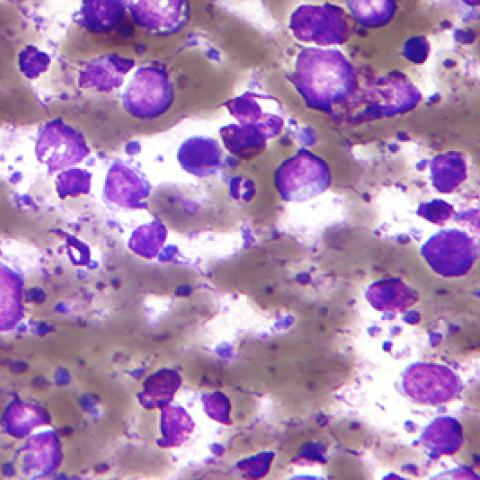
Large B-cell lymphoma
Photo credit: Wikimedia Commons
Patients with untreated or non-responding B-cell lymphoma that has spread to the central nervous system may be eligible to participate in a new clinical trial at the NIH Clinical Center.
Mark Roschewski, M.D., Senior Clinician in the Lymphoid Malignancies Branch, is leading a study of a new therapy to treat aggressive B-cell lymphoma that has spread to the brain and spinal cord (central nervous system or CNS). Lymphomas are “blood cancers” in the lymph nodes; B-cell lymphomas affect B cells, a type of white blood cell that fights infections. Secondary central nervous system lymphoma (sCNSL) is a rare cancer that starts in B cells and spreads to the CNS. There is no standard treatment for sCNSL leading researchers to test a new treatment regimen that combines six drugs that work in different ways to fight cancer: temozolomide, etoposide, Doxil, dexamethasone, ibrutinib and rituximab, together known as TEDDI-R. In a previous study, TEDDI-R improved outcomes for some patients with lymphoma that originated in the CNS. The goal of this study is to see if TEDDI-R is safe and can improve outcomes for patients with B-cell lymphoma that has spread to the CNS.
Clinicaltrials.gov identifier: NCT03964090
NCI Protocol ID: NCI-19-C-0103
Official Title: A Study of Temozolomide, Etoposide, Doxil, Dexamethasone, Ibrutinib, and Rituximab (TEDDI-R) in Aggressive B-cell Lymphomas With Secondary Involvement of the Central Nervous System (CNS)
The Center for Cancer Research is NCI’s internal cancer center, a publicly funded organization working to improve the lives of cancer patients by solving important, challenging and neglected problems in cancer research and patient care. Highly trained physician-scientists develop and carry out clinical trials to create the medicines of tomorrow treating patients at the world’s largest dedicated research hospital on the campus of the National Institutes of Health in Bethesda, Maryland.
For more information on CCR clinical trials click here, and subscribe to have the latest CCR clinical trials sent directly to your inbox.